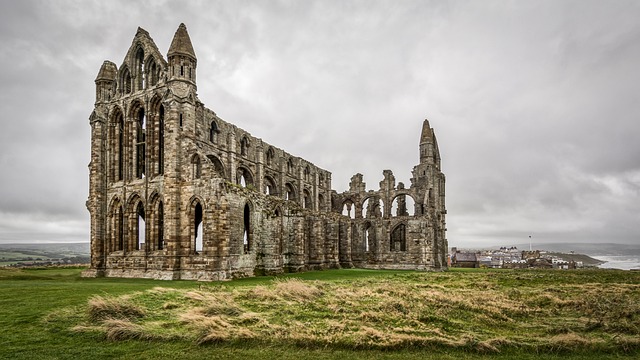The name Whitby is of English origin and means “white farm” or “white settlement.” In a Biblical context, the name Whitby may symbolize purity, innocence, and righteousness.
Table of Contents
Whitby: A Name with Anglo-Saxon Roots
Have you ever wondered about the meaning behind the name Whitby? This charming name has both general and biblical significance, making it a unique and intriguing choice for a baby name or a place name. Let’s delve into the origins and meanings of the name Whitby to uncover its rich history and symbolism.
Whitby is a name with Anglo-Saxon roots, derived from the Old English words “hwit,” meaning white, and “by,” meaning settlement or village. This combination of words gives Whitby the meaning of “white settlement” or “white village.” The name likely originated from the white cliffs that overlook the town of Whitby in North Yorkshire, England, giving it a picturesque and serene quality.
In addition to its general meaning, the name Whitby also has biblical significance. In the Bible, the color white is often associated with purity, righteousness, and holiness. The Book of Revelation describes a vision of a great multitude standing before the throne of God, clothed in white robes and holding palm branches. This image symbolizes the redeemed and purified souls who have been washed clean by the blood of the Lamb.
The biblical symbolism of white aligns with the meaning of the name Whitby, suggesting a place of purity and righteousness. This connection adds a spiritual depth to the name, making it a meaningful choice for those who value faith and spirituality.
Whether you choose the name Whitby for its general or biblical meaning, it carries a sense of beauty and tranquility that is sure to resonate with anyone who hears it. Its Anglo-Saxon roots give it a sense of history and tradition, while its biblical connotations add a touch of spiritual significance.
In conclusion, the name Whitby is a versatile and meaningful choice that can hold different interpretations for different people. Whether you are drawn to its Anglo-Saxon origins or its biblical symbolism, Whitby is a name that evokes images of purity, righteousness, and beauty. Consider the name Whitby for your next baby or as a unique and symbolic place name that reflects your values and beliefs.
Exploring the Historical Significance of Whitby
Have you ever wondered about the meaning behind the name Whitby? This charming seaside town in North Yorkshire, England, holds a rich historical significance that dates back centuries. The name Whitby itself has both general and biblical meanings that add to the town’s allure and mystique.
In general terms, the name Whitby is believed to have originated from the Old Norse words “hvitr” and “byr,” which translate to “white settlement” in English. This is likely due to the white cliffs that overlook the town and the white-washed buildings that line its streets. The name Whitby perfectly encapsulates the town’s picturesque beauty and serene atmosphere.
However, the biblical meaning of the name Whitby adds another layer of depth to its significance. In the Bible, the name Whitby is associated with the story of Saint Hilda, a revered abbess who played a crucial role in the spread of Christianity in England during the 7th century. Saint Hilda founded a monastery in Whitby, which became a center of learning and spirituality in the region.
The name Whitby is also linked to the biblical concept of light and purity. In the Bible, light is often used as a symbol of truth, righteousness, and divine guidance. The name Whitby reflects these qualities, as the town has long been associated with spiritual enlightenment and moral integrity.
The historical significance of Whitby is further enhanced by its connections to the famous Synod of Whitby, which took place in 664 AD. This important council was convened to resolve the differences between the Celtic and Roman Christian traditions in England. The Synod of Whitby ultimately led to the adoption of Roman practices in the English church, marking a significant turning point in the country’s religious history.
Whitby’s rich history and cultural heritage continue to attract visitors from around the world who are drawn to its ancient ruins, stunning coastline, and vibrant community. The town’s name serves as a reminder of its past and the enduring legacy of Saint Hilda and the Synod of Whitby.
As you wander through the narrow streets of Whitby, take a moment to reflect on the meaning of its name and the stories that have shaped its identity. From its Norse origins to its biblical associations, Whitby is a place steeped in history and tradition.
Whether you are a history buff, a nature lover, or simply seeking a peaceful retreat by the sea, Whitby offers something for everyone. Explore its ancient abbey, stroll along its sandy beaches, and immerse yourself in the timeless beauty of this enchanting town.
In conclusion, the name Whitby holds a special significance that reflects the town’s unique blend of natural beauty, historical importance, and spiritual significance. As you explore Whitby and learn more about its past, you will come to appreciate the depth and complexity of its name and the stories it represents. Whitby is more than just a name – it is a symbol of tradition, faith, and enduring legacy that continues to inspire visitors and residents alike.
The Biblical Meaning of the Name Whitby

Have you ever wondered about the meaning behind the name Whitby? Names often have interesting origins and can hold significant meanings. In this article, we will explore the general and biblical meanings of the name Whitby.
In general, the name Whitby is of English origin and is believed to have originated from the Old Norse words “hvitr” meaning white and “byr” meaning settlement or village. This suggests that Whitby may have originally referred to a settlement or village with white buildings or houses. The name Whitby is also the name of a town in North Yorkshire, England, known for its picturesque coastal views and historic abbey.
When it comes to the biblical meaning of the name Whitby, we can look to the Bible for insight. In the Bible, names often carry significant meanings and can provide insight into the character or destiny of the individual bearing the name. While the name Whitby itself does not appear in the Bible, we can still explore the biblical significance of the name.
In the Bible, the color white is often associated with purity, righteousness, and holiness. White garments are often symbolic of spiritual purity and righteousness. In the book of Revelation, white robes are mentioned as a symbol of the righteousness of the saints. This association with purity and righteousness can give the name Whitby a spiritual connotation.
Furthermore, the concept of a settlement or village in the biblical context can also hold significance. In the Bible, settlements or villages are often places of community, fellowship, and worship. The idea of a settlement can symbolize a place of belonging and connection with others. This sense of community and fellowship can add depth to the meaning of the name Whitby in a biblical context.
Overall, the name Whitby carries a sense of purity, righteousness, and community in both its general and biblical meanings. Whether you have a personal connection to the name Whitby or simply find it intriguing, exploring the meanings behind names can provide insight into their significance and symbolism.
In conclusion, names have the power to convey meaning and significance beyond their literal definitions. The name Whitby, with its origins in English and its potential biblical connotations, carries a sense of purity, righteousness, and community. Whether you are drawn to the name for its historical connections or its spiritual symbolism, exploring the meanings behind names can be a fascinating journey. Next time you come across the name Whitby, take a moment to consider the depth of its meaning and the stories it may hold.
Whitby: A Name with Spiritual Connotations
Have you ever wondered about the meaning behind the name Whitby? It’s a name that carries with it a sense of mystery and intrigue, with both general and biblical connotations. Let’s delve into the origins of this unique name and explore the spiritual significance it holds.
In general terms, the name Whitby is believed to have originated from Old Norse and Old English roots. The “Whit” part of the name is thought to come from the Old Norse word “hvitr,” meaning white or bright. This could refer to the white cliffs or bright waters of the coastal town of Whitby in North Yorkshire, England. The “by” suffix is a common element in English place names, denoting a settlement or village. So, Whitby could be interpreted as a bright settlement or village by the sea.
But the name Whitby also has biblical connotations that add a deeper layer of meaning. In the Bible, the concept of whiteness is often associated with purity, righteousness, and holiness. For example, in the book of Revelation, it is written that those who have washed their robes and made them white in the blood of the Lamb are blessed and will have the right to the tree of life.
This connection between whiteness and purity can be seen in the name Whitby as well. The bright or white aspect of the name could symbolize a place of spiritual purity or a community dedicated to righteousness and holiness. It could be seen as a beacon of light in a dark world, a place where the divine presence is felt and revered.
In this sense, the name Whitby takes on a deeper significance, pointing to a spiritual dimension that transcends the physical world. It suggests a place where the sacred and the mundane meet, where the divine and the human intersect. It invites us to consider the possibility of a higher purpose or meaning behind the name, a hidden truth waiting to be discovered.
So, whether you see Whitby as a bright settlement by the sea or a symbol of spiritual purity and holiness, the name carries with it a sense of mystery and wonder. It invites us to explore its origins and meanings, to uncover the hidden truths that lie beneath the surface.
Next time you hear the name Whitby, take a moment to reflect on its significance. Consider the general and biblical connotations it holds, and ponder the deeper meanings that may be hidden within. Who knows what secrets and revelations you may uncover as you delve into the mysteries of this intriguing name. Whitby: a name with spiritual connotations that beckons us to explore and discover the truths that lie within.
Uncovering the Symbolism Behind the Name Whitby
Have you ever wondered about the meaning behind the name Whitby? It’s a name that carries a sense of mystery and intrigue, with layers of symbolism waiting to be uncovered. In this article, we’ll delve into the general and biblical meanings of the name Whitby, exploring the rich history and significance behind this unique moniker.
In general terms, the name Whitby is believed to have originated from Old Norse and Old English roots. The “Whit” part of the name is thought to come from the Old Norse word “hvitr,” meaning white or bright. This could be a reference to the white cliffs that overlook the town of Whitby in North Yorkshire, England. The “by” suffix is a common element in English place names, denoting a settlement or village. So, when put together, Whitby could be interpreted as “white settlement” or “bright village.”
Beyond its general meaning, the name Whitby also holds significance in biblical contexts. In the Bible, the concept of light is often associated with purity, truth, and divine guidance. The name Whitby, with its connotations of brightness and whiteness, could be seen as a symbol of spiritual illumination and enlightenment.
In Christian theology, light is often used as a metaphor for God’s presence and guidance. The Bible frequently refers to God as the “light of the world,” shining in the darkness to lead His people on the right path. In this sense, the name Whitby could be seen as a reminder of God’s guiding light in our lives, illuminating the way forward and dispelling the shadows of doubt and confusion.
The symbolism of light is also present in the story of the Transfiguration, a pivotal event in the New Testament where Jesus is transfigured before His disciples, shining with a radiant light. This dazzling display of divine glory is a powerful symbol of Christ’s true nature as the Son of God, revealing His majesty and authority to those who witness it. The name Whitby, with its associations of brightness and brilliance, could be seen as a reflection of this divine light shining in the darkness.
In addition to its biblical symbolism, the name Whitby also carries echoes of historical significance. The town of Whitby in England has a rich heritage dating back to Roman times, with a long history of maritime trade and religious influence. Whitby Abbey, a prominent landmark overlooking the town, was founded in the 7th century by the Anglo-Saxon abbess Hilda and became a center of learning and spirituality in the medieval period.
The name Whitby, with its blend of Norse and English roots, reflects this diverse cultural heritage and the enduring legacy of the town’s past. It serves as a reminder of the people and events that have shaped Whitby’s history, from the Viking settlers who first established the settlement to the Christian monks and scholars who built the abbey and preserved its teachings for future generations.
In conclusion, the name Whitby holds a wealth of meaning and symbolism, both in general and biblical contexts. From its origins in Old Norse and Old English to its associations with light and enlightenment in Christian theology, Whitby is a name that resonates with layers of significance waiting to be uncovered. Whether you’re drawn to its historical roots or its spiritual connotations, Whitby is a name that invites exploration and contemplation, offering a glimpse into the mysteries of the past and the enduring truths of faith.
Conclusion
General meaning: Whitby is a place name of Old Norse origin meaning “white settlement by the river.”
Biblical meaning: There is no specific biblical meaning associated with the name Whitby.

